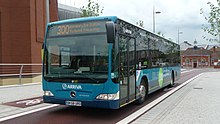| This article needs additional citations for verification. Please help improve this article by adding citations to reliable sources. Unsourced material may be challenged and removed. Find sources: "Single-deck bus" – news · newspapers · books · scholar · JSTOR (January 2023) (Learn how and when to remove this message) |


A single-decker bus or single-decker is a bus that has a single deck for passengers. Normally the use of the term single-decker refers to a standard two-axled rigid bus, in direct contrast to the use of the term double-decker bus, which is essentially a bus with two passenger decks and a staircase. These types of single-deckers may feature one or more doors, and varying internal combustion engine positions. The majority of single-deckers have a length of up to 12 m (39 ft 4 in), although some exceptions of longer buses exist. They also typically weigh between 11 and 14 t (12 and 15 short tons).
In regions where double-deckers are not common, the term single-decker may lack common usage, as in one sense, all other main types of bus have a single deck. Also, the term may become synonymous with the name transit bus or related terms, which can correctly be applied to double-deckers too.
With the exception of regions of major double deck or articulated bus operation, usually major urban areas such as Hong Kong, cities in the United Kingdom and Singapore, the single decker is the standard mode of public transport bus travel, increasingly with low floor features.
With their origins in van chassis, minibuses are not usually considered single-deckers, although modern minibus designs blur this distinction. Midibuses can also be regarded as both included with and separate from standard single-deckers, in terms of full size length and vehicle weights, although again design developments have seen this distinction blurred. Some coach style buses that do not have underfloor luggage space can also be correctly termed as single-deckers, with some sharing standard bus chassis designs, such as the Volvo B10M, with a different body style applied.

Notable examples of single-decker buses (excluding coaches, trolleybuses, midibuses and minibuses)
- Alexander Dennis Enviro200
- Alexander Dennis Enviro300
- Alexander Dennis Enviro350H
- BYD K9
- Daewoo BC212MA
- Daewoo BS105
- DAC 112UDM
- DAF SB220
- Dennis Dart
- Dennis Falcon
- Dennis Lance/Lance SLF
- Designline Olympus
- Hino Blue Ribbon
- Hino Rainbow
- Ikarus 260
- Irisbus Agoraline
- Irisbus Citelis
- Isuzu Erga
- Isuzu Cubic
- Iveco TurboCity
- Iveco Urbanway
- MAN NL262
- MAN NLxx3F
- MAZ-103
- MAZ-203
- Mercedes-Benz Citaro
- Mercedes-Benz O305
- Mercedes-Benz O405
- Mercedes-Benz O500M/U
- Mercedes-Benz OC 500 LE
- Mercedes-Benz OF-OH
- Mitsubishi Fuso Aero Star
- Nissan Diesel Space Runner RA
- Nova Bus LFS
- New Flyer Low Floor
- Optare Excel
- Optare Tempo
- Optare Tempo SR
- Orion VII
- Renault PR100.2
- Rocar Autodromo 812U
- Rocar De Simon U412
- Scania Citywide
- Scania K UB
- Scania L113
- Scania L94UB
- Scania N UB
- Scania N113
- Scania N94UB
- Scania OmniCity
- Solaris Urbino 12
- Thaco TB120CT
- VDL SB200
- VDL SB250
- Volvo B7RLE
- Volvo B8RLE
- Volvo B9L
- Volvo B10B
- Volvo B10BLE
- Volvo B10M
- Volvo B12BLE
- Optare Prisma
- Optare Solo
- Optare Solo SR
- Optare Solo Plus
- Optare Versa
See also
References
- "Factors Influencing Bus System Efficiency / Vehicle Size and Type". ppiaf.org. Retrieved 2023-01-09.
- Staff Writer (2015-08-04). "What Is the Weight of a Single-Decker Bus?". Reference.com. Retrieved 2023-01-09.
External links
| Buses | ||
|---|---|---|
| List | ||
| Chassis |  | |
| Roadway | ||
| Uses | ||
| Power | ||
| Manufacturing | ||